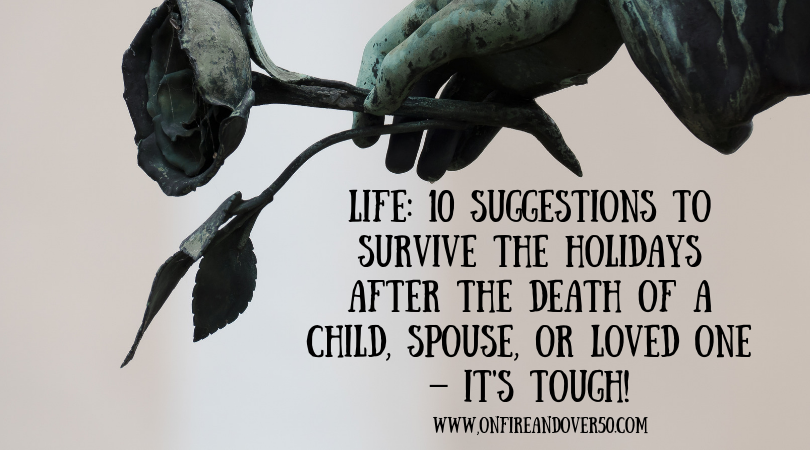This year alone I have experienced 6 deaths between family and friends.
It is hard to carry on sometimes. I hope this continues to help
anyone who is facing this situation.)
If you ask anyone who has lost a loved one, they will tell you it's hard to return to the life you had before the loss. That loss changes your life in varying degrees. If you ask someone who has lost a child, they will tell you it's devastating and impossible to return to life as it once was.
We who are over 50 strive to eat healthy, exercise, and live longer. We must also remember that the longer we live, the more losses of friends and family through death we will face. It's important to develop skills and a community to help ourselves and others deal with these losses.
As an over 50 person, I know I have experienced a lot of losses already in my life. The journey thru the fifties prepares us for the later years. Losing our hair, gaining weight, hormone changes, creaky joints, daily medications, etc. We have also most likely experienced the death of a loved family member. Still we struggle to survive the holidays without them.
I spoken to several of my friends and family about how they have dealt with the loss of a child or a loved one. I also researched suggestions from professional sources, such as a preacher, a church elder, a family counselor, and a doctor.
Here are the results of my research and interviews. I hope that this information helps someone whether you have lost a loved one, friend, or a child, or you are trying to help someone else who has experienced loss:
1. You may not feel like celebrating the first holiday and that's okay.
You don't owe anyone an explanation.
2. Sometimes getting away from home for the holidays is a good idea.
Different surroundings,
different traditions being made, and separation from reminders of holidays past. Stay in a different town or city, state or country, in a hotel or B&B, just somewhere different. It can ease the pain of the missing loved one.
3. You need at least one person that you can call on at any time during the holiday season.
Someone you trust,
someone who will just listen,
someone who is always available or
at least most of the time,
so that when you have a bad time,
you can call and talk through it.
4. If you have a grave to go to, decorate it. It helps to include that loved one
in the holiday and not leave them out.
If you don't have a grave to visit,
such as in cremation,
decorate the container or
the area around the container.
5. Donate to a charity, church, fund, or some other organization that helps others in your loved ones name.
Help someone else while helping yourself and memorializing your loved one. Volunteer someplace and help someone else in the memory of your loved one.
6. If you have a bereavement group to attend, go.
Share your feelings with those who have experienced what you have, people who know what you are going through.
7. Try to focus and reflect on the reason for the holiday.
For example, Christmas,
a time to celebrate the birth of Jesus; Easter is a time to reflect on Christ sacrifice for all mankind; etc.
8. Don't follow the family traditions of making cookies, putting up a tree, lighting your house outside, or anything that you don't feel like doing.
You are not at your normal energy level. Emotionally you are drained which also drains you physically.
9. Connect with your spiritual self.
Trust in God. Talk to God, pray to God, read God's word, go to worship services, and be honest.
God is the one that understands.
10. Do what makes you feel better,
do not let anyone tell you
that it's time to move on.
You are the only one who knows
when that time is.
This is not their journey, it is yours. Everyone is different, some take longer than others to move forward.
You never get over a loss, you only learn how to survive it.
Another consideration is medication. While it is better to handle issues without medication, sometimes we need to rely upon a mood enhancer or stress reducer to help us get through these holidays. There is nothing wrong with that, but just be sure that you don't allow yourself to become dependent on them. At some point you must learn to handle your emotions without medication.
It will get easier and you will get through this. It may seem like your world has ended and you are stuck in the darkness, but light will one day shine again. Each holiday season will get easier. It will never be the same and you shouldn't expect it to be. Later, you will establish new traditions while still remembering your lost beloved. Don't rush, take your time.
Next week, I am discussing what to do if you are the friend or family member of someone who has had a loss of a child, spouse, or other loved one.
How do you help them? What to say or not say. How can you be supportive when you have no idea how your friend or family member feels?
XOXO

 RSS Feed
RSS Feed